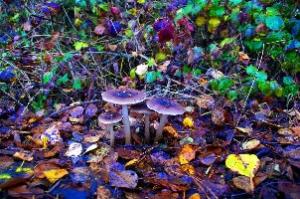The hunt for a pharmacological agent to help people strung out on cocaine get off the marching powder has been a long one, and non-traditional types of treatments are among the possibilities being studied. Ibogaine is one pharmacological therapy being studied. Another is href="https://www.uab.edu/news/research/item/9565-study-can-taking-a-hallucinogen-curb-cocaine-use" target=_blank_>psilocybin, the chemical that puts the magic in magic mushrooms.

The trial currently has almost 20 people enrolled, but researchers are looking for more subjects -- people who are currently using cocaine and have a strong desire to quit.
"Our goal is to create a tool or drug that provides significantly better outcomes for individuals addicted to cocaine than those that currently exist," said Sara Lappan, Ph.D., a postdoctoral scholar in the Department of Health Behavior
In the trial, participants receive a dose of psilocybin and are monitored for six hours, about the duration of the experience. Then, the researchers track his or her cocaine use.
"Our idea is that six hours of being under the effects of psilocybin may be as productive as 10 years of traditional therapy," Lappan said.
The researchers theorize that psilocybin works on three levels: the biochemical, the psychological, and the spiritual. In terms of biochemistry, psilocybin disrupts brain receptors thought to reinforce addictive behaviors. Psychologically, the drug is believed to reduce cravings, increase motivation, and increase one's sense of self-efficacy. Spiritually -- or transcendentally -- psilocybin (along with other psychedelics) is thought to increase both a person's sense of purpose and his or her sense of universal connectedness or oneness.
"If our hypotheses are supported, this has the potential to revolutionize the fields of psychology and psychiatry in terms of how we treat addiction," Lappan said.
But don't run out and start gobbling down magic mushrooms to quit cocaine just yet, the researchers cautioned.
"We aren't advocating for everyone to go out and do it," said Peter Hendricks, Ph.D., associate professor of health behavior in the School of Public Health at UAB. "What we are saying is that this drug, like every other drug, could have appropriate use in a medical setting. We want to see whether it helps treat cocaine use disorder."
They're not the only ones looking into the secrets of psilocybin. UAB is one of a half-dozen universities studying its potential medicinal benefits. The others are Johns Hopkins University, Imperial College London, New York University, University of California-San Francisco and Yale.
This article was produced by Drug Reporter, a project of the Independent Media Institute.
This work by StoptheDrugWar.org is licensed under Creative Commons Attribution-ShareAlike 4.0 International
Add new comment